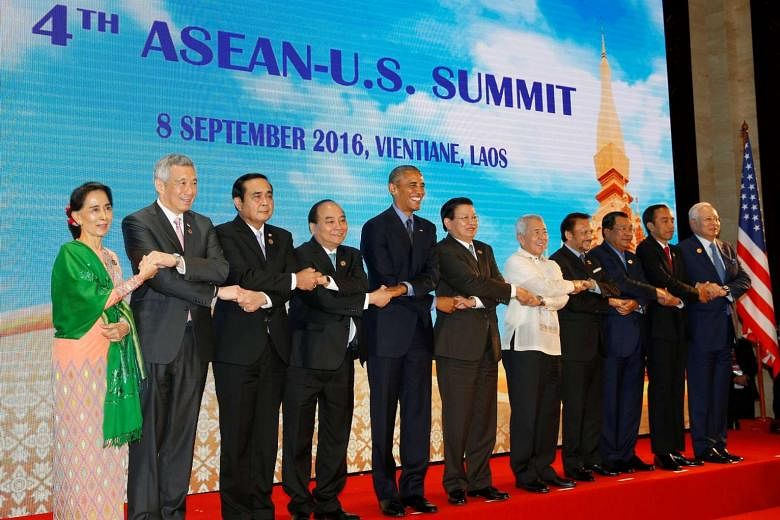In its editorial on Sep 9, the paper says the outgoing United States president has been a trusted friend of the region thanks to his understanding of South-east Asia's ambitions and limitations.
When Mr Barack Obama leaves the White House in January he will be acknowledged as the American president who maintained the closest relationship with Asean.
During his two terms he has visited several times, attending Asean-related summits and conferring with the member-countries' leaders.
Early on there was dismay when, due to turmoil at home, he postponed a planned visit to Indonesia and missed a leaders-only summit.
He quickly learned that there was a price to be paid for his absence from Asia - out of sight, out of mind. China has steadily been on the rise throughout his presidency.
Mr Obama came to appreciate the "Asean way" of business and politics and readily participated in the rounds of handshakes and photo ops, clad in the "official shirt", adeptly adjusting to the modus operandi in this part of the world.
The region's leaders are generally fond of him thanks to his humble demeanour, although new Philippines President Rodrigo Duterte has got off to a poor start with him.
With Mr Obama's natural charm as a reassuring beacon, the leaders of South-east Asia agreed to assemble at the Sunnylands resort in California last February without the usual drawn-out wrangling over venue and date.
It turned out to be their most fruitful encounter with the American president, greatly improving relations.
This week, for the latest Asean summit, Mr Obama became the first US president to visit Laos, a country ravaged by the US military during the Indochina conflict.
The host government let him to talk to a gathering of youth about democracy and human rights, a surprisingly congenial gesture for a country that lags behind its neighbours in these areas.
Vientiane had earlier refused to host the Asean People's Forum of civil-society organisations.
For Laos, the never-explained disappearance of social activist Sombath Somphon three years ago hampers international acceptance of the regime of Prime Minister Thongloun Sisoulith.
Mr Obama's call for more transparency had to be carefully balanced with the necessity of not offending the host, with which the US has only recently normalised relations.
America has much to be cautious about, its bombers salting great swathes of Lao territory during the 1970s in a bid to contain the spread of communism.
The countryside is still littered with unexploded ordnance, a permanent threat to life and limb.
Mr Obama, always a stirring speaker, has found an eager audience in the young people of South-east Asia.
On every visit he has made it a point to meet them, chiefly on occasions arranged by the US-sponsored Young South-east Asian Leaders Initiative.
No other American president has addressed the leaders of the future to this extent.
Under Mr Obama, relations were also normalised with Myanmar, helping lift the country out of its isolation.
Now, with world-renowned peace icon Aung San Suu Kyi as its de facto leader, Myanmar has the US as a willing attendant, ready to tackle the tricky challenges of dealing with a fledgling democracy.
The US "pivot" to Asia - another hallmark of the Obama regime - is unlikely to go down in history as a diplomatic victory, since it has had the effect of raising tensions in the region.
Part of that pivot is the most ambitious free-trade agreement ever attempted, the Trans Pacific Partnership, but the US Congress looks certain to bury Mr Obama's accord before his term ends, and both presidential candidates have come out against it as well.
American interest in Asia, clearly, should focus on stability and prosperity, not better business deals.
One aspect of the Obama legacy is evident already - greater sensitivity towards the ambitions and expectations of South-east Asia and towards Asian needs in general. We are unlikely to see anything of its kind for a long time to come.
----
The Nation is a member of The Straits Times' media partner Asia News Network, an alliance of 21 newspapers.

